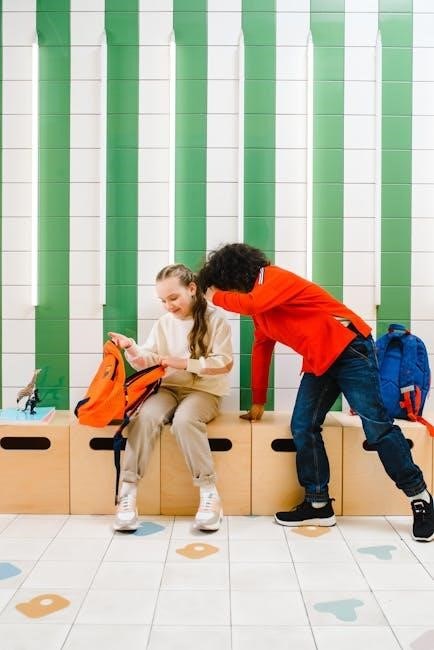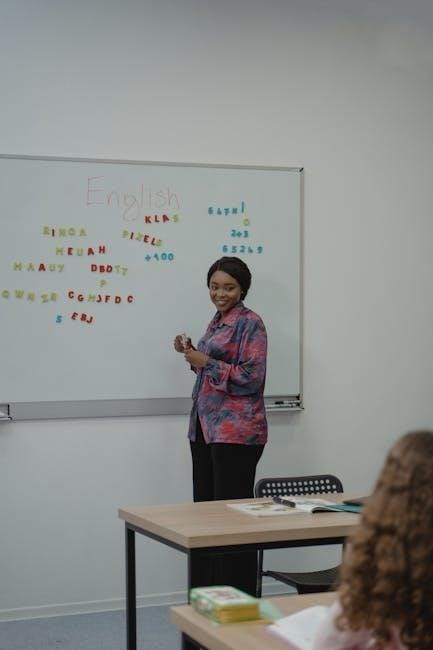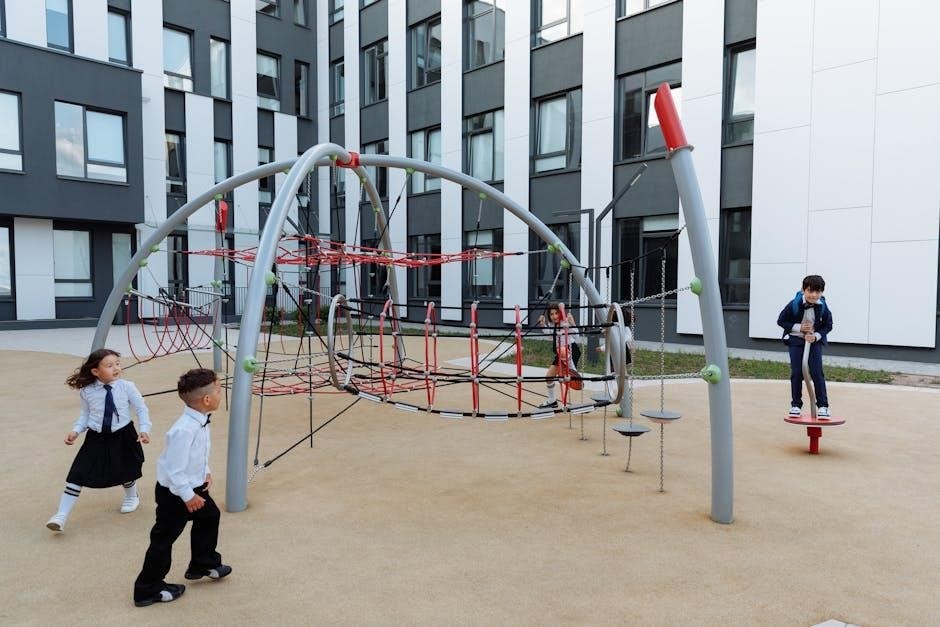Role-play is an interactive and immersive technique where students act out real-life scenarios‚ fostering communication skills‚ fluency‚ and confidence in English․ It engages learners in practical language application‚ making it a popular and effective method in ESL classrooms․
Importance of Role-Play in Developing Communication Skills
Role-play is a dynamic method that enables students to practice real-life scenarios‚ enhancing their ability to communicate effectively in English․ By engaging in activities like shopping‚ dining‚ or job interviews‚ learners develop essential speaking and listening skills․ Role-play fosters confidence‚ encouraging students to express themselves fluently in unfamiliar situations․ It also promotes active listening‚ as participants must respond appropriately to others․ This interactive approach helps students clarify doubts and refine their language use․ Additionally‚ role-play encourages creativity and collaboration‚ preparing learners for diverse social and professional interactions․ Regular practice through role-play activities ensures that students can apply their language skills practically‚ making communication more natural and spontaneous over time․
How Role-Play Enhances Fluency and Confidence
Role-play significantly enhances fluency and confidence by providing students with a safe space to practice English in real-life scenarios․ Through repeated practice‚ learners become more comfortable using new language structures and vocabulary‚ which improves their ability to communicate spontaneously․ The immersive nature of role-play allows students to focus on expressing ideas rather than just grammar rules‚ fostering natural speech patterns․ Additionally‚ role-play builds confidence by letting students experiment with language in a low-stakes environment‚ reducing the fear of making mistakes․ Over time‚ this practice translates into increased fluency and self-assurance‚ enabling students to navigate real-life situations with greater ease and effectiveness․
Benefits of Role-Play Activities for Students
Role-play activities engage students in practical language use‚ enhancing communication skills and confidence through interactive‚ real-life scenarios that make learning enjoyable and effective․
Improving Speaking and Listening Skills

Role-play activities provide students with opportunities to practice speaking and listening in real-life scenarios‚ enhancing their ability to communicate effectively․ By engaging in conversations‚ students improve pronunciation‚ intonation‚ and vocabulary use․ Listening skills are refined as they respond to cues and maintain dialogue flow․ These exercises build confidence‚ allowing learners to express themselves more naturally․ Interactive scenarios‚ such as shopping or dining‚ simulate authentic interactions‚ making language learning practical and engaging․ Regular role-play helps students develop fluency and accuracy‚ preparing them for real-world communication challenges․
Enhancing Vocabulary and Pronunciation
Role-play activities expose students to new vocabulary in context‚ helping them understand and use words appropriately․ By practicing scenarios like medical consultations or job interviews‚ learners gain familiarity with specialized terms and phrases․ Pronunciation improves as students mimic native-like intonation‚ stress‚ and rhythm in dialogues․ Engaging in conversations forces active use of vocabulary‚ reinforcing retention․ For example‚ discussing symptoms in a medical role-play teaches relevant expressions while refining speech clarity․ This practical application of language enhances both lexical knowledge and spoken accuracy‚ equipping students with the tools to communicate effectively in diverse situations․ Regular practice fosters confidence and precision in using English vocabulary and pronunciation․
Developing Critical Thinking and Problem-Solving Abilities
Role-play activities challenge students to think critically and solve problems in real-time‚ fostering analytical skills and creativity․ Scenarios like medical consultations or legal proceedings require students to evaluate situations‚ make decisions‚ and respond appropriately․ For example‚ in a medical role-play‚ students must describe symptoms‚ diagnose issues‚ and recommend treatments‚ enhancing their ability to process information and act decisively․ These exercises encourage adaptability‚ as students often face unexpected twists‚ prompting them to think on their feet․ By navigating complex dialogues and resolving conflicts‚ learners develop problem-solving strategies and improve their ability to handle challenging situations effectively․ This skill transfer is invaluable for real-life applications․
Popular Role-Play Topics for English Students
Common scenarios include shopping‚ dining‚ traveling‚ job interviews‚ and social interactions‚ allowing students to practice real-life conversations and build confidence in diverse situations․

Everyday Situations (e․g․‚ Shopping‚ Dining‚ Traveling)
Role-playing everyday situations like shopping‚ dining‚ and traveling helps students practice real-life conversations․ For example‚ in a shopping scenario‚ students can practice asking prices‚ describing items‚ and bargaining․ Dining role-plays involve ordering food‚ making requests‚ and handling special dietary needs․ Travel-related activities might include booking tickets‚ asking for directions‚ or resolving luggage issues․ These scenarios are relatable and allow learners to apply language skills in practical contexts‚ boosting their ability to communicate effectively in English․ Such activities also build confidence and prepare students for real-world interactions‚ making them more comfortable in unfamiliar situations․
Professional Scenarios (e․g․‚ Job Interviews‚ Business Meetings)
Role-playing professional scenarios‚ such as job interviews and business meetings‚ equips students with essential communication skills for workplace interactions․ In job interviews‚ students practice articulating qualifications‚ responding to questions‚ and showcasing confidence․ Business meeting role-plays focus on negotiation‚ decision-making‚ and collaborative problem-solving․ These activities simulate real-world professional environments‚ helping learners develop polished language and etiquette․ By engaging in these scenarios‚ students gain experience in formal dialogue‚ improving their ability to express ideas clearly and persuasively․ Such exercises also build confidence‚ preparing students for future career interactions and enabling them to navigate professional situations with ease and effectiveness․
Social Interactions (e․g․‚ Parties‚ Neighbourhood Disagreements)
Role-playing social interactions‚ such as parties or neighbourhood disagreements‚ helps students navigate everyday communication challenges․ These scenarios teach appropriate language for casual conversations‚ conflict resolution‚ and cultural etiquette․ For example‚ party role-plays focus on greetings‚ small talk‚ and polite interactions‚ while neighbourhood disagreements emphasize respectful argumentation and compromise․ Such activities enhance students’ ability to express emotions‚ manage conflicts‚ and understand social norms․ By simulating real-life interactions‚ learners build confidence in using English in informal settings․ These exercises also foster cultural awareness‚ preparing students to interact effectively in diverse social environments․ This practical approach makes learning engaging and relatable‚ improving overall communication skills in a fun and dynamic way․

Advanced Role-Play Scenarios
Advanced role-plays involve complex situations like medical consultations‚ legal proceedings‚ and cultural etiquette‚ challenging students to use specialized vocabulary and nuanced communication‚ enhancing their language proficiency and adaptability․
Medical Consultations and Health Discussions
Medical consultations and health discussions are advanced role-play scenarios where students practice communicating symptoms‚ diagnoses‚ and treatments․ These activities teach appropriate language for medical settings‚ such as describing symptoms‚ understanding diagnoses‚ and following treatment advice․ Students learn to use specialized vocabulary related to health and medicine‚ enhancing their ability to express needs clearly․ Role-plays involving doctor-patient interactions help students build confidence in discussing sensitive topics; This scenario is particularly useful for students who may need to seek medical help in English-speaking environments․ By simulating real-life medical situations‚ students improve their fluency and accuracy in using health-related expressions‚ making them more comfortable in actual medical consultations․ This practical application of language skills is invaluable for learners․
Legal Proceedings and Adversarial Systems
Legal proceedings and adversarial systems role-plays involve students acting out scenarios like court trials‚ client-lawyer meetings‚ or negotiations․ These activities help learners develop formal communication skills‚ such as articulating arguments‚ understanding legal terminology‚ and responding appropriately in high-stakes situations․ Students learn to adopt roles like lawyers‚ witnesses‚ or judges‚ enhancing their ability to think critically and express themselves clearly․ These scenarios also teach the importance of tone‚ precision‚ and professionalism in legal contexts․ By simulating real-life legal interactions‚ students gain confidence in using complex language structures and applying legal concepts practically․ This role-play topic is particularly beneficial for students interested in law or requiring English for professional legal settings․
Cultural and Social Etiquette Practices
Role-play activities focused on cultural and social etiquette help students navigate diverse customs‚ greetings‚ and social norms from different countries․ Scenarios include dining etiquette‚ traditional celebrations‚ or formal events‚ teaching learners to respect cultural differences․ These exercises enhance cross-cultural communication by simulating interactions in various social settings‚ such as parties‚ meetings‚ or community gatherings․ Students learn appropriate body language‚ polite expressions‚ and how to handle sensitive situations gracefully․ By practicing these interactions‚ learners develop a deeper understanding of cultural nuances and improve their ability to interact respectfully in multicultural environments․ This fosters inclusivity and prepares students for real-life encounters in global contexts․

Creating Effective Role-Play Activities

Effective role-play activities require clear objectives‚ relevant vocabulary preparation‚ and encouragement of creativity․ Setting guidelines and fostering improvisation enhance engagement and practical language application for students․
Setting Clear Objectives and Guidelines
Setting clear objectives and guidelines is essential for effective role-play activities․ Teachers should define specific language goals‚ such as practicing vocabulary or improving pronunciation․ Providing students with structured scenarios and roles ensures they understand expectations․ Guidelines‚ like time limits and participation rules‚ help maintain focus․ Clear instructions enable students to prepare relevant phrases and questions‚ enhancing their performance․ Establishing a supportive environment encourages creativity and reduces anxiety․ By aligning activities with learning outcomes‚ role-play becomes a purposeful tool for language development․ Proper planning ensures that students engage meaningfully‚ fostering both individual growth and collaborative learning experiences․
Preparing Students with Relevant Vocabulary and Phrases
Preparing students with relevant vocabulary and phrases is crucial for successful role-play activities․ Teachers should provide lists of key words‚ expressions‚ and questions tailored to the scenario‚ such as medical terms for health discussions or interview questions for job scenarios․ This ensures students feel confident and prepared․ Pre-teaching phrases like “How can I help you?” or “I have a headache” enables them to communicate effectively․ Pair or group work to practice these phrases beforehand also fosters collaboration․ By equipping students with the right language tools‚ role-play becomes more engaging and meaningful‚ helping them navigate real-life situations with ease and accuracy․
Encouraging Creativity and Improvisation
Encouraging creativity and improvisation in role-play activities allows students to think on their feet and express themselves authentically․ By providing open-ended scenarios rather than scripted lines‚ students can personalize their responses and explore different perspectives․ Teachers can foster creativity by allowing students to adapt roles or invent new ones‚ making the activity more engaging; Encouraging students to use their own experiences and ideas ensures the role-play feels natural and relevant․ Positive feedback and a supportive environment further motivate students to take risks and experiment with language․ This approach not only enhances fluency but also builds confidence‚ as students learn to navigate unpredictable situations with ease and originality;

Assessment and Feedback in Role-Play Exercises
Assessment and feedback in role-play exercises involve evaluating student performance‚ providing constructive criticism‚ and documenting progress to enhance language skills and confidence․

Evaluating Student Performance and Participation
Evaluating student performance in role-play exercises involves observing their communication skills‚ problem-solving abilities‚ and engagement․ Teachers assess language accuracy‚ fluency‚ and appropriateness‚ while noting creativity and teamwork․ Feedback is provided to highlight strengths and areas for improvement‚ ensuring learners understand their progress․ Participation is crucial‚ as it reflects students’ willingness to engage and practice․ Instructors may use rubrics or checklists to document achievements and set future goals․ Constructive feedback helps students refine their skills‚ fostering confidence and motivation․ Encouraging active participation ensures all learners benefit‚ even those who may be hesitant to engage initially․
Providing Constructive Feedback for Improvement
Constructive feedback is essential for helping students improve their role-play performance․ Teachers should focus on specific aspects‚ such as language use‚ pronunciation‚ and problem-solving skills․ Feedback should be clear‚ actionable‚ and tailored to individual needs․ For example‚ highlighting effective communication strategies while suggesting areas for improvement․ Encouraging self-reflection and peer feedback can also enhance learning․ Positive reinforcement boosts confidence‚ while constructive criticism guides students toward better outcomes․ Providing examples of successful interactions helps learners understand expectations․ Regular feedback ensures continuous growth‚ enabling students to refine their skills and apply them in future role-play activities․ This approach fosters a supportive learning environment focused on improvement and progress․
Documenting Progress and Growth
Documenting progress and growth in role-play activities is crucial for tracking students’ development․ Teachers can use portfolios‚ checklists‚ or video recordings to capture performances over time․ This documentation helps identify improvements in communication skills‚ vocabulary usage‚ and problem-solving abilities․ Students can also reflect on their own progress‚ fostering self-awareness and motivation․ Regular documentation allows educators to tailor feedback and activities to meet individual needs․ For example‚ tracking a student’s ability to handle medical consultations or job interviews highlights their growth․ This systematic approach ensures that learners receive targeted support‚ enabling them to build confidence and fluency in English․ Documentation also provides a clear record of achievements‚ celebrating progress and encouraging continued effort․

Using Technology in Role-Play Activities
Technology enhances role-play by providing virtual platforms for practice‚ recording tools for feedback‚ and multimedia resources to enrich scenarios‚ making learning interactive and accessible for students․

Virtual Role-Play Platforms and Tools
Virtual role-play platforms and tools are revolutionizing language learning by providing immersive and interactive environments for students to practice English․ These platforms offer realistic scenarios‚ enabling students to engage in conversations and situations that mimic real-life interactions․ Tools like virtual reality (VR) and augmented reality (AR) create immersive experiences‚ while online platforms allow students to role-play with peers or AI-driven characters․ Many platforms also include recording features‚ enabling students to review their performances and receive feedback․ Additionally‚ these tools often provide access to pre-designed scenarios‚ such as job interviews or medical consultations‚ making it easier for educators to implement role-play activities․ This technology enhances engagement‚ accessibility‚ and the overall learning experience‚ catering to diverse learning styles and confidence levels․
Recording and Reviewing Performances
Recording and reviewing performances is a valuable aspect of role-play activities‚ allowing students to reflect on their language use and identify areas for improvement․ By capturing role-play sessions‚ students can analyze their pronunciation‚ grammar‚ and fluency‚ gaining insights into their strengths and weaknesses․ This method also enables educators to provide targeted feedback‚ highlighting specific moments where improvements can be made․ Over time‚ reviewing these recordings helps students track their progress and build confidence in their abilities․ Additionally‚ it fosters a growth mindset‚ encouraging learners to embrace mistakes as part of the learning process․ This reflective approach enhances overall language development and performance quality․
Integrating Multimedia and Digital Resources
Integrating multimedia and digital resources into role-play activities enhances engagement and provides students with diverse learning experiences․ Tools like videos‚ audio clips‚ and interactive PDFs can be used to set scenarios‚ demonstrate dialogues‚ or provide authentic materials for practice․ Digital platforms offer access to a wide range of role-play topics‚ such as everyday situations‚ professional scenarios‚ and social interactions‚ catering to different proficiency levels․ Multimedia resources also allow students to exposure to various accents‚ intonations‚ and cultural nuances‚ enriching their understanding of the language․ Additionally‚ digital tools enable interactive and collaborative learning‚ making role-play activities more dynamic and effective for English language learners․
Role-play is a dynamic tool for English learners‚ offering practical language practice and confidence-building․ It bridges theory and real-life application‚ fostering overall language proficiency and cultural understanding effectively․
Summarizing the Value of Role-Play in English Learning
Role-play is a powerful tool in English language learning‚ offering students the chance to practice real-life scenarios in a controlled environment․ It enhances communication skills‚ fluency‚ and confidence‚ allowing learners to apply vocabulary and grammar in context․ By engaging in scenarios like shopping‚ job interviews‚ or medical consultations‚ students develop practical language abilities․ Role-play also fosters creativity‚ problem-solving‚ and cultural understanding‚ making it a versatile and effective method for all proficiency levels․ Its interactive nature encourages active participation‚ helping students bridge the gap between theoretical knowledge and real-world application․ Ultimately‚ role-play empowers learners to communicate authentically‚ preparing them for diverse social and professional situations․
Encouraging Continued Practice and Application
Consistent practice is essential for reinforcing language skills gained through role-play․ Encouraging students to engage in regular role-play activities helps solidify their understanding and application of English in real-life contexts․ Motivating learners to practice outside the classroom‚ such as through online platforms or language clubs‚ further enhances their progress․ By providing accessible resources like scenario cards or digital tools‚ educators can inspire students to continue exploring diverse topics independently․ Regular practice fosters confidence‚ fluency‚ and the ability to adapt to new situations‚ ensuring that role-play becomes a lifelong tool for effective communication in English․
